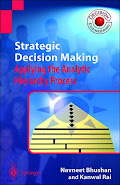In the preface to the second edition of now classic, The Sciences of the Artificial, Herbert A. Simon, the noble winning MIT professor says, “…artificiality is interesting principally when it concerns complex systems that live in complex environments. The topics of artificiality and complexity are inextricably interwoven…”. When we talk about Innovation we are taking about the artificial – it is man made. We can learn from natural systems – the science of nature – explaining what is as is. The sciences of the artificial are concerned with making what we want to create – it is making, designing, inventing; it is the endeavor of human mind to achieve an objective. It is about creating by thinking – it is about crafting a system that achieves an objective or a goal.
One may argue that since man and the human mind itself is a natural system, anything that it creates automatically is considered natural – hence it is really artificial to talk about sciences of the artificial. Well, we will not get into semantics or the philosophy of the so called differences. Suffice it to say we limit ourselves to the subject of Innovation, which is concerned with a goal-oriented craft of man-made “artifacts”. We will not be concerned with explaining natural phenomenon, although we can learn from natural phenomenon to develop and describe methods to innovate. We will instead focus on crafting methods, techniques, methodologies, processes, systems, solutions to make, design, invent, produce or craft artifacts, processes, concepts, or systems that are considered output of human ingenuity.
The natural systems evolve; many of the unnatural ones are designed. We have heard of the top-down and bottom-up approaches to design, construction and creation. We also have seen changes in environment as a powerful influence on how a system evolves, changes itself or gets killed, just like many species in natural system that we know off. We also have been told about the limits of human knowledge and inherent randomness of our world – forcefully articulated in two of the recent books by NNT (“Black Swan” and “Fooled by Randomness”).
Given that all we know or may know will be useless when faced with randomness, the methods of science – explaining things as they are- are not necessarily the methods of the artificial. Further we don’t really know how to build complex systems as we believe “nature knows best” – the evolutionary, adaptive, complex, living organisms – the conceptual framework that exists. “How to Innovate” in such plethora of thoughts – does it make any sense to talk about this question at all.
It does and it doesn’t at the same time. Well, this is the typical diabolical statement that has close to zero information to most. However, information theory says uncertainty means the event has more information.
Do we have a single answer to the question, " How to Innovate"?

1 comment:
"Small aim is a crime"
nice
Post a Comment